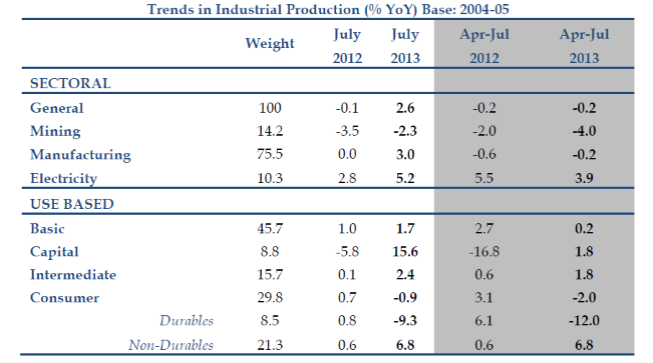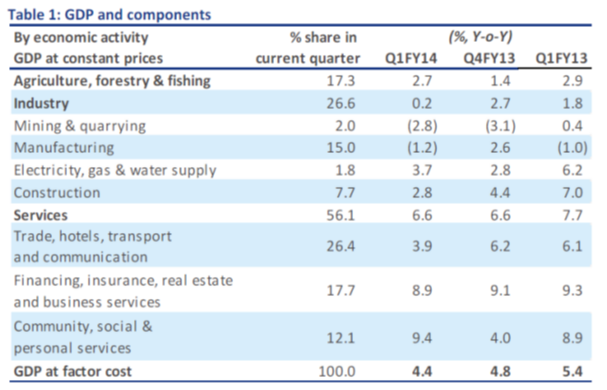Index of Industrial Production
Comparison of economic performance over time is a key factor in economic analysis and a fundamental requirement for investing. The Index of Industrial Production (IIP) has historically been one of the most well-known and well-used indicators for deciphering manufacturing activity in the country. The IIP measures volume changes in the production of an economy, and therefore provides a measurement that is free of influences of price changes, making it an indicator of choice for many investors.
The all India IIP is a composite indicator that measures the short-term changes in the volume of production of a basket of industrial products during a given period with respect to that in a chosen base period. It is compiled and published monthly by the Central Statistics Office (CSO) with the time lag of six weeks from the reference month.
Sectoral Bifurcation (with 2004-2005 as base)
|
Sector |
Weight |
|
Manufacturing |
75.53% |
|
Mining |
14.16% |
|
Electricity |
10.31% |
|
Total |
100% |

Source: CSO
What IIP Signifies?
· Low IIP suggests slow growth which in turn is detrimental to overall GDP Growth.
· Low Manufacturing Data suggests businesses are either finding it difficult to increase production or they are simply pushing back major expansion. This could mean fewer jobs going forward.
· Low Capital Goods number suggests that companies are just not buying new equipment. Capital goods are basically machines and equipment used in the production of goods. A negative number means that output of such machines is well below the baseline used for the series, and a clear pointer that companies are not interested in increasing their output until they see a change in the economic environment.
· Consumer durables normally splurge during festive seasons.
· If the IIP data comes out better than the market expectation the yield in the bond market shows an upward trend as it reduces expectation of rates cuts by RBI and vis-a-versa.
Gross Domestic Product
Gross Domestic Product (GDP) is one of the most important macroeconomic indicators for economists and investors. GDP measures how fast or how slow the domestic economy is growing. The GDP report contains an enormous amount of information, and can be overwhelming and intimidating to new analysts. In simple terms, GDP represents the total value of all goods and services that were produced in the Indian and sold (both domestically or exported).

Sources: CSO
Importance of GDP
· GDP consists of consumer spending, Investment expenditure, government spending and net exports hence it portrays an all inclusive picture of an economy because of which it provides an insight to investors which highlights the trend of the economy by comparing GDP levels as an index.
· GDP is used as an indicator for most governments and economic decision-makers for planning and policy formulation
· In case of GDP, each component is given the weight of its relative price. In market economics it clicks as prices reflect both marginal cost of the producer and marginal utility for the consumer, i.e. people sell at a price that others are willing to pay
·G DP helps the investors to manage their portfolios by providing them with guidance about the state of the economy
· Calculation of GDP provides with the general health of the economy. A negative GDP growth portrays bad signals for the economy. Economists analyse GDP to find out whether the economy is in recession, depression or boom.
GDP Impact on Bonds
When the GDP report is released, its value is immediately compared to market expectations. The bond market is likely to react positively if the GDP value is at or below the expected value. This is especially true if real final sales are poor and inventories are increasing because of slowing demands. Flat or declining economic growth is likely to motivate the RBI to decrease the interest rates -- this can increase demand for bonds, and push prices higher.
Conversely, the value of existing bonds could drop if GDP exceeds expectations. A strong GDP report coupled with rising inflation will increase speculation and fears that the RBI will increase short-term interest rates.
GDP Impact on the Currency
A strong economy supports interest rates and corporate profits. This combination attracts foreign investors to both the stock market and to the bond market. This attraction increases the supply of dollars, and can help increase the value of the rupee relative to other foreign currencies.
We will explain the impact of Monetary & Quantitative easing of Central Banks of debt & currency markets in the next edition on Mirae Asset Knowledge Academy Tutorials.
Mutual fund investments are subject to market risks, read all scheme related documents carefully.




